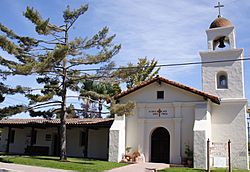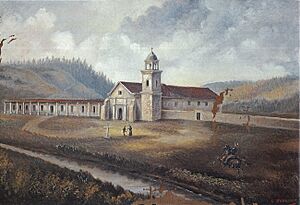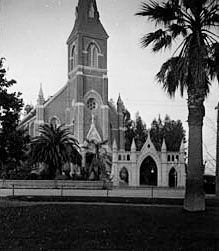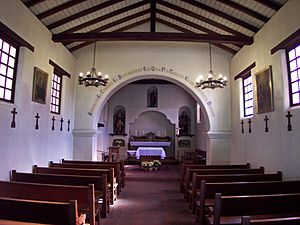Mission Santa Cruz facts for kids

The Mission Santa Cruz chapel replica
|
|
| Location | 130 Emmett St Santa Cruz, California 95060 |
|---|---|
| Coordinates | 36°58′41″N 122°1′46″W / 36.97806°N 122.02944°W |
| Name as founded | La Misión de la Exaltación de la Santa Cruz |
| English translation | The Mission of the Exaltation of the Holy Cross |
| Patron | The Exaltation of the Cross |
| Nickname(s) | "The Hard-luck Mission" |
| Founding date | August 28, 1791 |
| Founding priest(s) | Father Fermín Francisco de Lasuén |
| Founding Order | Twelfth |
| Military district | Fourth |
| Native tribe(s) Spanish name(s) |
Awaswas, Mutsun, Yokuts Costeño |
| Native place name(s) | Aulintak |
| Baptisms | 2,765 |
| Marriages | 860 |
| Burials | 2,120 |
| Secularized | 1834 |
| Returned to the Church | 1859 |
| Governing body | California Department of Parks and Recreation; Diocese of Monterey |
| Current use | Santa Cruz Mission Adobe museum; Parish chapel |
| Reference no. | #75000484 |
| Reference no. | #342 |
| Website | |
|
Mission Hill Area Historic District
|
|
| Location | Mission Street |
| Area | 38 acres (15 ha) |
| Architectural style | Spanish Colonial, Stick-Eastlake-Queen Anne—Victorian |
| NRHP reference No. | 76000530 |
| Added to NRHP | May 17, 1976 |
Mission Santa Cruz is a special historical site in Santa Cruz, California. It is a replica of one of the old Spanish missions built a long time ago. Its full Spanish name means "The Mission of the Exaltation of the Holy Cross."
The first mission was started on August 28, 1791, by Father Fermín Francisco de Lasuén. It was built near the San Lorenzo River. However, the river flooded the mission during the winter rains. Because of this, the mission was moved to the top of a nearby hill.
Over time, the second mission building was damaged by an earthquake and fell apart. Much of it was removed to build the Holy Cross Church in 1889. Later, in the 1930s, a smaller copy of the original chapel was built. This replica is now a historical monument and a small church.
Next to the replica chapel, there is one original building left from the mission. This adobe building was constructed between 1822 and 1824. It was where Native American families lived after they became Catholic and worked at the mission. It is the oldest building still standing in Santa Cruz County. It is also the best-preserved Native American home from any of the old California missions. Today, it is part of Santa Cruz Mission State Historic Park.
Contents
The Mission's Early Days
The first mission was set up near a Native American village called Aulintak. This village was close to the San Lorenzo River. On August 28, 1791, Franciscan priests arrived to teach Christianity to the Awaswas people. They named the settlement after a Christian holiday, "Exaltation of the Cross." This name came from a nearby creek that explorer Gaspar de Portolá had named in 1769.
The first mission building was small and officially opened on September 25, 1791. It was located on the flat land near the river. But that winter, heavy rains caused the river to flood the mission. So, between 1791 and 1793, the priests rebuilt the mission on a hill overlooking the river.
Like other California missions, Mission Santa Cruz was a place where Native Americans learned about Catholicism. First, the local Amah Mutsun people, also known as Costeño or Ohlone, lived and worked there. Later, Yokuts people from further east also came to the mission.
Mission Santa Cruz was one of the smaller missions. It was protected by soldiers from the Presidio of San Francisco.
Challenges and Changes
In 1797, a town called Branciforte was started across the San Lorenzo River. The mission priests were not happy about this town being so close. They believed the people from Branciforte were a bad influence on the Native Americans at the mission.
In 1812, Father Andrés Quintana died during a conflict with some of the Native Americans living at the mission. They were upset about how he treated them.
In 1818, the mission heard that a pirate named Hipólito Bouchard was coming to attack. The mission was emptied, and its valuable items were moved. People from Branciforte were asked to protect the mission's belongings, but the priests later accused them of stealing. The mission residents then fled to a new mission for safety.
One of the few stories from a Native Californian about life in a mission came from Lorenzo Asisara. He was born at Mission Santa Cruz in 1819. In 1877, he shared what his father had told him about the events surrounding Father Quintana's death.
The Mission's Later Years
The front wall of the original adobe mission, built in 1794, was destroyed by an earthquake in 1857. A wooden front was added, and the building was used for other things. A new wooden church was built next to it in 1858. In 1889, the current Holy Cross Church was built. It stands where part of the original mission church and cemetery used to be.
Today, the Holy Cross Church is still an active church. Behind it, you can find a piece of the stone foundation from one of the mission buildings. There are also a few old gravestones from the mission cemetery. The smaller "replica" chapel, built in the 1930s, is used for daily services and private events.
The area where the original mission complex stood is now Plaza Park. The mission once had as many as 32 buildings. The only original mission building left is a dormitory for Native American residents. It has been restored and is now a museum. It is part of the Santa Cruz Mission State Historic Park.
In the 1930s, Gladys Sullivan Doyle paid for the replica chapel to be built. She asked to be buried inside, and her grave can be seen there. Since there were no photos of the original chapel, the replica's design was based on a painting from 1876 by Léon Trousset. This painting hangs inside the chapel today.
A local builder named Tranquilino Costella constructed the concrete replica chapel. The small chapel is mainly used for private services and daily Masses. There is also a gift shop next to it. A stone fountain from the original mission stands in the garden behind the gift shop.
Santa Cruz Mission Historic Park
The only original adobe mission building that survived is a dormitory where Native American residents lived. It has been restored and is now called the Neary-Rodriguez Adobe. It is part of the Santa Cruz Mission State Historic Park.
The Santa Cruz Mission is recognized as California Historical Landmark number 342. The Neary-Rodriguez Adobe was added to the National Register of Historic Places listings in Santa Cruz County, California in 1975. The entire Mission Hill Area became a United States Historic District in 1976.
The "Lost Adobe"
In 1978, stone foundations of an unknown adobe building were found on Mission Hill. After much research, no records of this building were found, so it was called the "Lost Adobe." Digs from 1981 to 1984 showed that it had more than 18 rooms. It likely housed Native American families, including Yokuts and Ohlone people, in the 1820s and 1830s. The Lost Adobe fell apart in the 1800s, and nothing remains of it today. This area is on private land, so visitors cannot go there.
Mission Hill Train Tunnel
There is a hidden railroad tunnel that runs under Mission Santa Cruz. In 1876, the South Pacific Coast Railroad built this tunnel. It helped move train traffic away from the busy downtown area. You can find the entrance at the end of Amat Street. The tunnel goes under the church's parking lot and Emmett Street, coming out at Chestnut Street. This tunnel is still used today by the Santa Cruz, Big Trees and Pacific Railway.
Interesting Facts About Mission Santa Cruz
- This mission was the 12th of the 21 California missions.
- It is the only mission not named after a person.
- The mission built on higher ground became known as the "Hard Luck Mission." This was because a disease spread, wiping out about half of its population.
- Many redwood trees from the area were used to build the mission structures.
- It is one of only four original adobe buildings left in Santa Cruz County.
- Weddings are held at both the Holy Cross Parish Church and the Mission Chapel.
- There is a small garden behind the mission. It has the original hand-carved baptismal font.
|
See also
- Spanish missions in California
- List of Spanish missions in California
- USNS Mission Santa Cruz (AO-133) – a ship built during World War II
 | Toni Morrison |
 | Barack Obama |
 | Martin Luther King Jr. |
 | Ralph Bunche |





